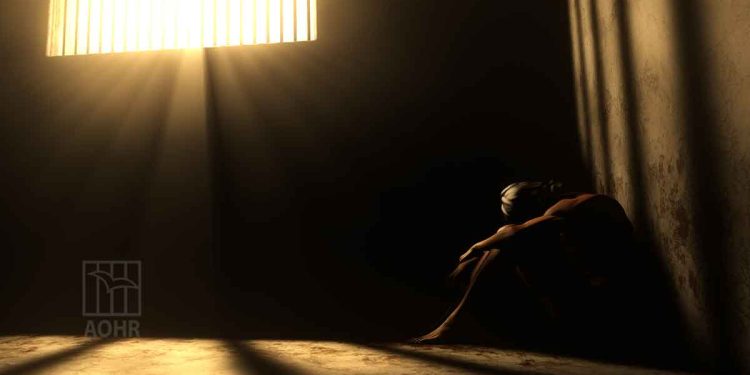Arab Organisation for Human Rights in the UK (AOHR UK) emphasised that the leaked videos of the lives of detained leaders of the Muslim Brotherhood in the high-security Badr 3 prison are evidence of the inhumane and sickening conditions they suffer inside Egyptian prisons.
The leaked videos showed the detainee Mahmoud Ezzat, who was the acting leader of the Brotherhood, 80, walking inside his solitary cell, filled with rubbish. It showed him sleeping on the floor and covering the window of the cell with a blanket and tape to keep warm in winter. One side of this cover had fallen off due to the strong winds. The footages confirm the complaints Ezzat made before the court, that he suffers from the freezing weather inside his cell and that he never sees the sunlight or breathes fresh air. The leaks showed other detainees suffering from the same harsh conditions.
In response, the Ministry of Interior claimed the videos were fabricated and had nothing to do with the people mentioned in the leaked videos. It claimed that they were receiving medical care and using the all prison facilities, adding that it would take legal measures regarding these allegations.
The Ministry of Interior had previously published a number of videos of good cells in Badr Prison that contains beds and TVs, and claimed that it was made according to the international standards, however hundreds of testimonies were leaked from the prison confirming that some of its cells are worse than those in the notorious Scorpion Prison.
Previously, AOHR UK had pointed out that these detainees have been held in solitary confinement and denied visits since the moment of their arrest. It added that they have never seen the sunlight nor been able to even speak to any person for varying periods of up to seven years. As a result, they were only served the prison food that came in small portions and poor quality. They are also exposed to psychological torture and many of whom have attempted suicide.
The high frequency of deaths inside Egyptian prisons due to the deliberate policy of medical negligence against opponents and killing them slowly is very alarming.
The most recent death of detainees were two who died in less than 24 hours, two days ago, and those are Ahmed Meselhi in Gamasa Prison, and Adel Qassem in the 10th of Ramadan Prison.
Badr Prison was opened in December 2021, and it had a wide media coverage by Egyptian state media, which promoted the new prison to be reflecting a “new era” for human rights in Egypt where prisoners would move to “rehabilitation centres” of international standards.
However, prisoners never enjoyed the minimum standards of human treatment, and most of the Brotherhood’s leaders remained in solitary confinement, deprived of receiving visits, and banned entirely from exercising.
It is worth noting that the Egyptian Penal Code does not provide any penalty called “solitary confinement,” which is a disciplinary measure for detainees who violate prison regulations, where they spend a week or ten days at most in solitary cells. Still, the Egyptian regime uses it as a permanent abuse measure against political opponents.
AOHR UK appealed several times to international human rights bodies to exercise maximum legal, economic and political pressure on the Egyptian regime in order to improve the human rights situation in Egypt. It also appealed to them to stop funding the Egyptian regime, which has been systematically violating the rights of the opposition since July 2013. However, international bodies and various political systems chose to ignore the application of human rights in Egypt, which exacerbated the crisis to unprecedented levels.
AOHR UK stressed that it will not remain silent over the violations of the Egyptian regime and will continue seeking all human rights, legal, media and political solutions. It will also continue to coordinate with human rights bodies, influential figures, decision-makers and human rights defenders around the world, to expose the crimes of the Egyptian regime and end its violations against the opposition and the detainees in particular.






























